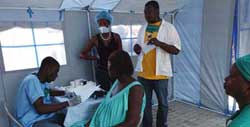Cuba calls for full delivery of international aid to Haiti
- Submitted by: admin
- Caribbean
- international
- Health and Medicine
- Personalities
- 04 / 03 / 2010

Cuba has called for full delivery of international aid to Haiti agreed at the UN Haiti donor conference in New York on Wednesday.
Cuban foreign minister Bruno Rodriguez Parrilla said there should not be projects of doubtful charity or splitting of Haiti into market segments as the US $9.9 billion starts to trickle into the earthquake devastated island.
“After that devastating earthquake that shook humanity's consciousness we only hope that the many promises we have listened to could in fact materialise; that Haiti's independence and sovereignty be respected and ennobled so that the government of President Rene Preval and Prime Minister Jean Max Bellerive could exercise all its faculties and benefit not the banks or foreign companies, but the Haitian people especially the poorest,” Rodriguez told the UN donor conference.
“Generosity and political will are of the essence. We need unity in Haiti and not projects of doubtful charity or a country split into market segments.”
He said the international community was highly indebted with Haiti.
“All of us have the moral obligation to contribute additional financial resources and cooperate more with Haiti not only to support its reconstruction but especially its development,” Rodriguez said.
UN donor conference pledged US $9.9 billion in immediate and long-term aid for Haiti. The international community is to deliver US $5.3 billion of support over the next two years to help Haiti rebuild infrastructure.
And Rodriguez invited all governments without exception to contribute to the medical programme that had been launched in Haiti aimed at delivering low cost medicare to almost 75 per cent of the population.
Rodriguez said the programme for the Reconstruction and Strengthening of the National Health System in Haiti that the President Preval government designed with the cooperation of the Cuban government, Venezuela and other countries and
humanitarian agencies would ensure broad health coverage especially for low income people.
He said that programme comprised 101 primary health care centres, which were right now being created.
“It has been estimated that every year 2,800,000 patients could be assisted; 1,300,000 medical emergencies will be taken care of; 168,000 child deliveries will be assisted and three million vaccines will be applied,” Rodriguez said.
He said added to that, there were the services of 30 community referral hospitals scattered throughout the country that had been equipped with state-of-the-art technology to guarantee secondary health care.
Rodriguez said every year over 2.1 million patients would be attended to and 54,000 surgeries performed including one million emergencies, carrying out 276,000 electrocardiograms, 144,000 diagnostic ultrasound tests, 43,000 endoscopies, 181,000 X-rays, 107 odontological consultations and 487,000 laboratory tests.
He said Cuba planned to create a National Tertiary Health Care Specialties Hospital in Haiti for which he counted on the cooperation of other countries.
Rodriguez said as many as 80 high level Cuban specialists would be working in those hospitals in charge of clinical departments and services, research, teaching and training of the Haitian professionals who will progressively replace them.
He said in four years time, the cost of those services would reach US $690,540,739.
“It is possible to do it,” Rodriguez said. “Our practical experience can attest to that. In fact, this programme is already in progress.
Since the earthquake, 23 such primary health care centres have been operating and so is the case for 15 of the community referral hospitals and 21 of the rehabilitation wards.”
He said there were already 783 Cuban doctors working in the programme together with 482 Haitian doctors and 278 specialists from another 28 countries.
Rodriguez said last Saturday a Memorandum of Understanding was signed in Port-au-Prince aimed at strengthening the Public Health Services and Epidemiological Surveillance System.
He said the MOU involves Cuba implementing the health programme in Haiti using Brazilian resources.
“The medical programme that we are proposing will benefit 75 per cent of the population most in need at a minimum cost,” said Rodriguez.
By Larry Moonze in Havana, Cuba
Source: www.postzambia.com
Comments